| Srl | Item |
| 1 |
ID:
127885
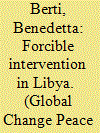

|
|
|
|
|
| Publication |
2014.
|
| Summary/Abstract |
Following the end of NATO 'Operation Unified Protector' in Libya there has been an intense debate in the international community with respect to the impact of the military engagement on both the emerging 'responsibility to protect' (R2P) norm as well as on the international community's commitment to enforce it. The study examines the impact of the international military intervention in Libya on this debate by looking at whether Operation Unified Protector contributed to strengthening or weakening the development of R2P. To do so, it first examines whether the authorization to use force in Libya was indeed grounded on R2P, as well as whether it was perceived as such by the international community. Secondly, the research examines whether the intervening parties' actual use of force was consistent with R2P. Finally, the research provides an assessment of the current state of R2P post-Libya.
|
|
|
|
|
|
|
|
|
|
|
|
|
|
|
|
| 2 |
ID:
127887
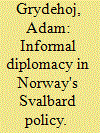

|
|
|
|
|
| Publication |
2014.
|
| Summary/Abstract |
The Arctic archipelago of Svalbard is under a limited form of Norwegian sovereignty and its settlements - among the northernmost in the world - are sites of activity by a range of states, most notably Russia. Norway's Svalbard policy has historically focused on marginalizing Russian influence. Through the use of informal diplomacy involving the creation of an economically diverse town (Longyearbyen, population around 2,070) and the promotion of scientific research, Norway is consolidating its control over the archipelago. At the same time, however, it risks losing authority within Svalbard due to the strengthening of local democracy in Longyearbyen and the increasing opportunities in Svalbard for the involvement of non-traditional Arctic actors such as the Asian economic powers. This article considers the historical basis for the present situation in Svalbard as well as the complex results of Norway's attempt to achieve its foreign policy through informal diplomacy.
|
|
|
|
|
|
|
|
|
|
|
|
|
|
|
|
| 3 |
ID:
127858
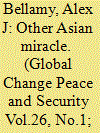

|
|
|
|
|
| Publication |
2014.
|
| Summary/Abstract |
East Asia has a long history of genocide and mass atrocities. For much of the Cold War, East Asia was one of the world's most violent regions, experiencing multiple outbursts of mass killing. Since the end of the Cold War, however, the region has been transformed thanks to another Asian miracle. There are now fewer cases of genocide and mass atrocities in East Asia today than at any point in history for which we have reliable records. This article demonstrates and then tries to account for the dramatic decline of mass atrocities in East Asia. It argues that the decline was enabled by a combination of three major structural changes: reduction in the selection of mass atrocities as a weapon of war, increase in incomes, and progress towards democratization combined with the emergence of new ideas about sovereignty and their accommodation with existing principles of non-interference. Together, these structural and ideational changes created a changed regional context of increased costs and reduced payoffs for the commission of mass atrocities.
|
|
|
|
|
|
|
|
|
|
|
|
|
|
|
|
| 4 |
ID:
127897
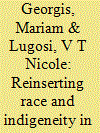

|
|
|
|
|
| Publication |
2014.
|
| Summary/Abstract |
The common narrative of how International Relations (IR) has evolved is based on a chronological linear view of continual progress. This story divides the history of the discipline into phases punctuated by the three Great Debates. However, the analytical categories of race and indigeneity have been missing from all these debates; these erasures in the stories of IR are made possible through a series of ontological and epistemological manoeuvres. These in turn, structure a 'common sense' of what the boundaries of IR are, or what they should be. This is evident in the exclusion of what can be seen as major international security issues, which are largely ignored by the discipline. This paper employs an IR post-colonial perspective, using the example of sex trafficking in Canada and the US to demonstrate how the field of IR remains silent on its colonial legacy, with the wider aim of thinking about the implications that omission has for the discipline.
|
|
|
|
|
|
|
|
|
|
|
|
|
|
|
|
| 5 |
ID:
127892
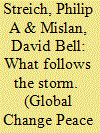

|
|
|
|
|
| Publication |
2014.
|
| Summary/Abstract |
In the last decade the concept of disaster diplomacy has drawn interest to the links between major natural disasters and international conflict. This paper reviews the disparate set of works covering this relationship. This body of work, which draws on multiple disciplinary traditions extending over three generations, holds vast potential for political scientists that seek to understand the intersection of ecological catastrophe and politics. The latest wave of publications has the greatest potential to yield valuable and generalizable insight into political phenomena as well as to produce practical knowledge for disaster-related organizations and agencies, policymakers, and citizens. This paper reviews the three generations of literature and then makes suggestions along three lines of argument: (1) refining definitions of variables, (2) refining the concept of 'disaster diplomacy', and (3) using existing theories and concepts of interstate conflict.
|
|
|
|
|
|
|
|
|
|
|
|
|
|
|
|